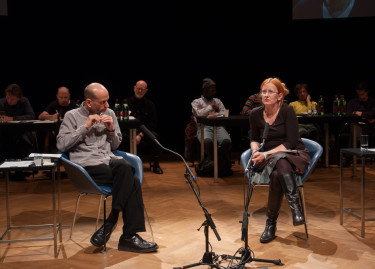Heading to TQW (Vienna) tomorrow for the Dialogues series put together by Adrian Heathfield and me. It runs Thur. 22nd – Sat. 24th Nov.
The Dialogues series.. is the continuation of their intensive analysis of the ambivalent tension between creativity and critical analysis. In Dialogues they explore the importance of the lecture performance for knowledge production in performance art. Paradigmatically, they not only present two lecture performances, but in a ten-hour marathon they also create direct encounters between artists, thinkers and curators, which is at the same time intended to be serious and playful, organised yet uncontrolled. Variants of public discourse are rehearsed around art and performance, with games and rules of relationships being explored on the basis of the most penetrating and productive questions. Dialogues produces the emotions of a live encounter within the boundaries of experience and thought.
Or something like that.
There will be a lecture/performance from Adrian and I called In So Many Words, and a lecture from Matthew Goulish and Lin Hixson of Goat Island, titled Every House Has a Door. Most exciting perhaps will be Saturday’s epic discussion event The Frequently Asked for which Adrian and I are joined by: Jonathan Burrows, Matthew Goulish, Lin Hixson, Janez Janša, Joe Kelleher, Bojana Kunst, Alastair MacLennan, La Ribot, Boyan Manchev, William Pope.L, Goran Sergej Pristaš, Alan Read, Irit Rogoff and Rebecca Schneider as well as by Hugo Glendinning (on the video cameras).
What has performance got to do with survival? What place do feelings have in art? Sixteen frequently asked experts from performance and other branches pose frequently asked questions on contemporary art. The spectrum of these questions includes the experimental and metaphysical, the practical and the hypothetical, the mundane and the absurd. The total playing time of The Frequently Asked is ten hours – a marathon in the formation of dialogue pairs each followed by discussion. The audience can join in the discussion and come and go at any time. Etchells’ and Heathfield’s play of questions makes good what Vilém Flusser already noted 20 years ago: “And no longer discourse but dialogue will structure future culture; that is, no longer ‘progress’ but mutual encounter.”
 The Frequently Asked, 2007
The Frequently Asked, 2007